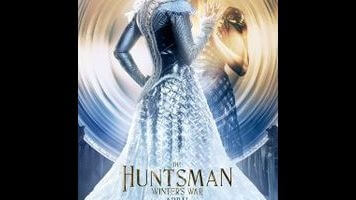“You may be surprised by how things turn out,” says one superpowered, impeccably costumed fairy-tale queen to another during the opening section of The Huntsman: Winter’s War. In strict plot terms, her suggestion does not come to pass. But logistically speaking, she’s on to something. It turns out, for example, that the negligible 2012 fantasy film Snow White And The Huntsman was considered popular enough to forge a cinematic universe, and to such an extent that Universal Pictures deemed it prudent to move forward without the participation of Snow White (Kristen Stewart). Further, anyone who enters into Winter’s War expecting either a sequel or a prequel may be surprised by how it turns out to be both.
In its opening moments, the new movie introduces Freya (Emily Blunt), sister of Ravenna, whose supernatural powers are awakened by a personal tragedy; she’s basically an angrier Elsa from Frozen. Once she powers up, Freya forms a new kingdom and raises an army by capturing the children of her (somewhat inexplicable) enemies and raising them into well-trained Huntsmen, warriors with little discernible purpose. Eric is one such Huntsman, and grows close to another, Sara (Jessica Chastain). Sensing their bond, Freya separates the two. Years later, following the events of Snow White, a forest-wandering Eric is recruited to destroy Ravenna’s magic mirror, which has been cast as a heavier, more unwieldy version of the One Ring. To destroy it requires the strength of a hero, as well as a professional furniture mover.
That’s the basic outline of a movie that’s busy with deaths, resurrections, side-switching, and unconvincing fake-outs. It’s all pretty silly, but it compensates for a lack of emotional weight with star power. The movie’s formidable and female-heavy cast is made up of some of the most talented Hollywood actress yet to a succumb to a comic book movie. Perhaps they are hoping to log their big-budget fantasy time quickly, painlessly, and in the company of other talented performers; whatever the reason might be that a goofy Snow White follow-up should retain Theron and also recruit both Blunt and Chastain, their mere presence helps immeasurably. This is especially true for the fantasy-of-remarriage material between a spirited Chastain and a knocked-around Hemsworth, still sporting a mumbly Scottish accent and still great at taking imaginary punches. (He also trades barbs with a smaller but more engaging group of dwarves, including the first film’s Nick Frost.) Their physical, sparring relationship configures a more modern fairy-tale romance, close to what the previous Snow White movie seemed to be stumbling around in search of. Really, Winter’s War is superior to its predecessor in almost every way, with better pacing, funnier dwarves, a less overcast tone, and vastly more goblins.
The movie is enjoyable enough, then, to feel like both a course correction and a missed opportunity. Snow White And The Huntsman was hampered by a first-time feature director with experience in effects-heavy commercials. Naturally, when given the opportunity to replace him, the producers have simply hired the visual effects supervisor of Snow White And The Huntsman: Cedric Nicolas-Troyan, another first-time director who often shoots fantastical sights in a square, borderline mundane style. When Eric and Sara are given the chance to fight their way through two groups of soldiers to reunite, Nicolas-Troyan doesn’t bother figuring out an inventive way of putting both of their fight scenes into the frame together. He just cuts back and forth with a listless paucity of imagination. Like too many blockbuster-level directors, he settles for directing effects-heavy traffic.
The filmmakers may have built in an excuse for dumbing down their technique: Winter’s War is, in the end, more fairy tale than swashbuckler, even though it works better as the latter. (Neither Huntsman movie is as sprightly a fairy tale as Tarsem Singh’s underappreciated Snow White picture Mirror Mirror.) The real auteur here is costume designer Colleen Atwood, allowed to run wild with liquid, flowing dresses, webbed ice gowns, and stylish leather battle gear. Though it’s filled with CG effects, enough of Winter’s War feels enough like an old-fashioned production—stars, costumes, sets!—to forgive cornball narration, thematically wrought games of chess, and lame intimations of further sequels. It’s inarguably a waste of time; both its stars and its audience probably deserve better. But sometimes wasting time can be fun in the right company.

